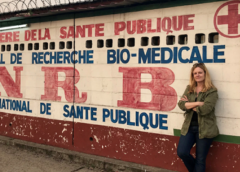Dr. Anne Rimoin, UCLA Fielding School of Public Health professor of epidemiology and the Gordon-Levin Endowed Chair in Infectious Diseases and Public Health, has been studying monkeypox for two decades, including as director of the UCLA Center for Global and Immigrant Health and Founder/Director of the affiliated UCLA-DRC Health Research and Training Program, in the Democratic Republic of the Congo (DRC).

Dr. Anne Rimoin, UCLA Fielding School of Public Health professor of epidemiology and the Gordon-Levin Endowed Chair in Infectious Diseases and Public Health, has been studying monkeypox for two decades, including as director of the UCLA Center for Global and Immigrant Health and Founder/Director of the affiliated UCLA-DRC Health Research and Training Program, in the Democratic Republic of the Congo (DRC).
« What Do We Know – and Need to Know – About Monkeypox?
Newswise — LOS ANGELES – Dr. Anne Rimoin, UCLA Fielding School of Public Health professor of epidemiology and the Gordon-Levin Endowed Chair in Infectious Diseases and Public Health, has been studying monkeypox for two decades, including as director of the UCLA Center for Global and Immigrant Health and Founder/Director of the affiliated UCLA-DRC Health Research and Training Program, in the Democratic Republic of the Congo (DRC).
Q. In simplest terms, what is monkeypox?
A. Monkeypox is a viral zoonosis, a virus that is transmitted from animals to humans. It’s endemic in parts of Central and West Africa. Monkeypox is from the same family as smallpox but causes less severe disease. Monkeypox was discovered in the late 1940s when outbreaks of a pox-like illness occurred in monkey colonies that were being used for research in Denmark – hence the name monkeypox. But the name is a misnomer. Monkeys can be infected by the virus, but it’s thought to be more commonly spread by small rodents and squirrels that are native to the forests of Africa.
There are two genetically distinct types, or clades, of the monkeypox virus. The Central African, or Congo Basin, clade and West African clade. The Central African clade is thought to spread more easily and causes more severe disease. It is also associated with a higher mortality rate (6 – 10%) than the West African clade (1-3.5%).
Q. How do you get monkeypox?
A. Transmission can occur when a person comes into contact with the virus from an animal, human, or materials that are contaminated with the virus, known as fomites. The virus enters the body through broken skin, the respiratory tract or mucous membranes – meaning the eyes, nose or mouth. Animal-to-human transmission generally occurs from a bite or a scratch, preparing or eating wildlife, direct contact with body fluids or lesion material, or indirect contact through contaminated materials like bedding.
Q. What are the symptoms?
A. The initial symptoms of monkeypox are typically flu-like. The first few days of symptoms include fever, headache, aches and pains, fatigue, and swollen lymph nodes. Within a few days, a distinctive rash develops; the illness is usually self-limiting and lasts 2-4 weeks.
Monkeypox is a serious infection and can be fatal; mortality estimates range from 1 – 3.5% for the West African clade and up to 10% for the Central African clade. It’s important to note that these figures are from lower resource African settings with more limited access to health care. Of the cases that have been reported in high resource settings – including the 2003 outbreak in the U.S. Midwest and importations to Europe, Israel, Singapore, U.K. and U.S. – there have been no fatalities. This suggests that supportive care and treatment can be very effective.
Q. Are there vaccines and therapeutics that can be used to prevent or treat monkeypox?
A. Because monkeypox virus is closely related to smallpox virus, the smallpox vaccine can protect people from getting monkeypox. Past data from Africa suggests that smallpox vaccine is at least 85% effective in preventing monkeypox. Smallpox and monkeypox vaccines are effective at protecting people against monkeypox, when given before exposure to monkeypox. Experts also believe that vaccination after a monkeypox exposure may help prevent the disease or make it less severe.
Vaccination after exposure to monkeypox virus is still possible. However, the sooner an exposed person gets the vaccine, the better.
The U.S. Centers for Disease Control and Prevention recommends the vaccine be given within four days from the date of exposure in order to prevent onset of the disease. If given between four and 14 days after the date of exposure, vaccination may reduce the symptoms of disease, but may not prevent the disease.
In addition, there are treatments licensed for smallpox that can be used to treat cases of monkeypox including cidofovir, ST-246, and vaccinia immune globulin.
Q. How concerned should we be?
A. The risk of monkeypox to the general public is very low. Monkeypox is still a very rare infection and only a few cases have been identified so far in the U.S. That said, whenever we see a virus behaving differently or spreading in a new population, it’s concerning. We are seeing the virus move through populations in ways we haven’t seen before, so it is a situation that requires rapid attention, and a lot of study and action.
We are still in the early stages of trying to understand how and when the virus was introduced from Africa, and if it is the result of a single introduction or multiple introductions. There is also a possibility that it has been spreading silently without detection for a while and because we weren’t looking, we didn’t find it. With excellent disease surveillance, case investigation, contact tracing, and sequencing of samples, this will become clearer over time. The story is still unfolding, but we don’t even know where we are in the plot. It’s like tuning into a new series, but not knowing exactly which episode you landed on. It could be episode 2 or episode 5. We have missed some of the origin story and need to catch up.
The bottom line is, monkeypox is a rare disease. It’s unlikely that most people in the U.S. will ever come in contact with it. While a substantial illness, it hasn’t caused any fatalities in high income settings. There are vaccines and treatments. And the world is more aware of what it takes to contain outbreaks.
=============
The UCLA Fielding School of Public Health, founded in 1961, is dedicated to enhancing the public’s health by conducting innovative research, training future leaders and health professionals from diverse backgrounds, translating research into policy and practice, and serving our local communities and the communities of the nation and the world. The school has 761 students from 26 nations engaged in carrying out the vision of building healthy futures in greater Los Angeles, California, the nation and the world.

Rod Washington: Rod is a blogger, writer, filmmaker, photographer, daydreamer who likes to cook. Rod produces and directs the web series, CUPIC: Diary of an Investigator. He also produces news and documentary video projects. Check out his podcast StoriesThisMoment at https://m3e.d71.myftpupload.com/stm-tncn-podcasts/


